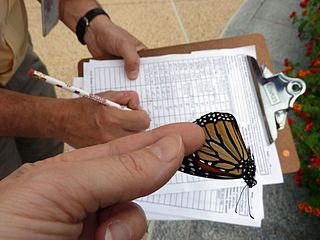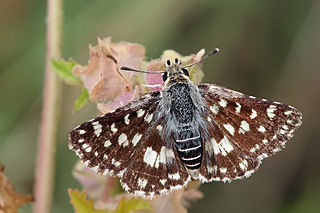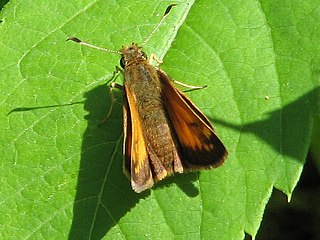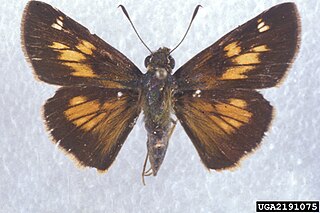
Morus, a genus of flowering plants in the family Moraceae, consists of 19 species of deciduous trees commonly known as mulberries, growing wild and under cultivation in many temperate world regions. Generally, the genus has 64 subordinate taxa, three of which are well-known and are ostensibly named for the fruit color of the best-known cultivar: white, red, and black mulberry, with numerous cultivars and some taxa currently unchecked and awaiting taxonomic scrutiny. M. alba is native to South Asia, but is widely distributed across Europe, Southern Africa, South America, and North America. M. alba is also the species most preferred by the silkworm, and is regarded as an invasive species in Brazil and the United States.
Poanes aaroni, the saffron skipper, is a North American butterfly from the skipper family (Hesperiidae) which occurs in salt marshes along the Atlantic coast.

Butterfly watching is a hobby concerned with the observation and study of butterflies. It also includes the "catch and release" of butterflies. There are clubs, handbooks, checklists, and festivals devoted to the activity.

Pyrginae, commonly known as spread-winged skippers, are a subfamily of the skipper butterfly family (Hesperiidae). The subfamily was established by Hermann Burmeister in 1878. Their delimitation and internal systematics has changed considerably in recent years with the most recent review being in 2019.

Poanes is a genus of skipper butterflies distributed throughout North and Central America. The larvae feed on grasses and sedges. The genus was erected by Samuel Hubbard Scudder in 1872.

The subfamily Theclinae is a group of butterflies, often referred to as hairstreaks, with some species instead known as elfins or by other names. The group is part of the family Lycaenidae, the "gossamer-winged butterflies". There are many tropical species as well as a number found in the Americas. Tropical hairstreaks often have iridescent blue coloration above, caused by reflected light from the structure of the wing scales rather than by pigment. Hairstreaks from North America are commonly brown above. Few Theclinae are migratory. Members of this group are described as 'thecline'.

The Hobomok skipper is a North American butterfly of the family Hesperiidae.

Poanes viator, the broad-winged skipper, is a skipper butterfly found in North America.

Poanes yehl, the Yehl skipper, is a butterfly of the family Hesperiidae. It is found from southeastern Virginia west to southwestern Missouri and south to eastern Texas, the Gulf Coast and northern Florida.

Ochlodes sylvanoides, the woodland skipper, is a butterfly of the family Hesperiidae. It is found in North America from British Columbia south to southern California, east to Montana, Colorado and Arizona.

Lon taxiles, the taxiles skipper, is a species of grass skipper in the family Hesperiidae. It is found in Central America and North America.











